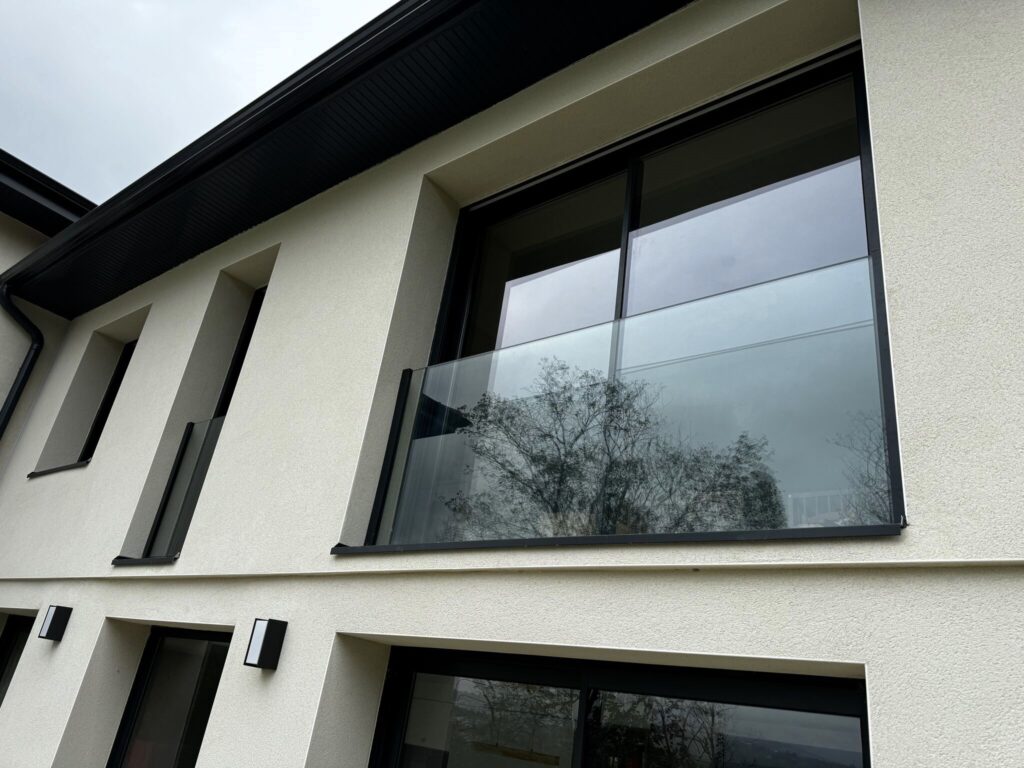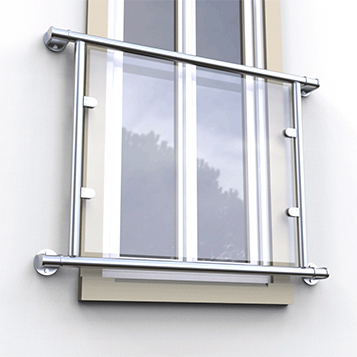At first glance, a Juliette balcony (also spelled Juliet balcony) can seem like a minimalist architectural detail. But in reality, it’s a carefully designed feature that combines form, function, and flair. Most commonly found on upper-floor windows or French doors, a Juliette balcony doesn’t have a protruding floor you can stand on. So what is a Juliette balcony? It’s a guarding balustrade—often made of glass or metal—placed across a full-length opening to provide safety while still letting in fresh air, natural light, and stunning views.
But today, the traditional wrought iron aesthetic is being steadily replaced by something more modern, more seamless, and more light-enhancing: the glass Juliette balcony.
Where Does the Term ‘Juliette Balcony’ Come From?
The name “Juliette balcony” is a nod to Shakespeare’s famous heroine Juliet Capulet. In Romeo and Juliet, Juliet appears on a balcony to speak to Romeo below. While there’s no historical evidence that this type of balcony looked like what we see today, the name has stuck—especially in the UK and Europe.
Also called a balconette or French balcony, the feature became particularly popular in Georgian and Victorian architecture, where tall windows were often installed in tight urban spaces that didn’t allow for full balconies. The design has evolved, but the core idea—opening up indoor space to the outdoors without extending the footprint—remains the same.
The Rise of Glass Juliette Balconies
Over the past two decades, glass Juliette balconies have surged in popularity, especially in new-build homes, modern apartment complexes, and renovation projects looking for clean lines and unobstructed views. Rather than using wrought iron or steel bars, glass provides a minimalist finish, allowing natural light to flood the room while still meeting building safety standards.
According to Homebuilding & Renovating, light is one of the top five features British homeowners look for in home design, especially in urban properties where space is tight but views are valuable [source].

Key Advantages of a Glass Juliette Balcony
So, why are so many architects and homeowners turning to glass balustrades over traditional designs? Let’s break it down:
1. Uninterrupted Views
Unlike steel or iron bars that can visually clutter a window, glass offers a completely clear view of the outdoors. This is especially beneficial in homes overlooking gardens, countryside, or urban skylines.
2. More Natural Light
Glass reflects and lets in light, helping interiors feel larger, brighter, and fresher—a major win for flats, lofts, and townhouses where windows can be the only real source of daylight.
3. Safety Without Compromise
Toughened, laminated, or safety-rated glass used in Juliette balconies complies with British Building Regulations, including BS 6180:2011 for barriers in buildings [source]. This means they’re structurally strong, impact-resistant, and child-safe.
4. Modern, Minimalist Aesthetic
Glass simply looks cleaner. It aligns with contemporary architectural trends where less is more and transparency is prized.
5. Low Maintenance
Unlike iron which can rust or timber that can rot, high-quality glass panels (like those offered in our Juliette balcony range) are weather-resistant and require only occasional cleaning.
Do You Need Planning Permission for a Juliette Balcony in the UK?
In most cases, you do not need planning permission to install a Juliette balcony—especially when it’s a glass design that doesn’t project outward and alter the building’s footprint. However, this can vary depending on your local council or if your property is:
- Listed
- In a conservation area
- Part of a flat (which has different permitted development rights)
As per the UK Government’s Planning Portal, if the balcony has no platform and is essentially a balustrade guarding an opening, it’s considered permitted development [source].
Still, it’s always wise to consult your local planning authority or an architect before installing anything structural.
Are Glass Juliette Balconies Safe?
Absolutely—when installed correctly and using certified materials. All the glass Juliette balconies sold here at Balustrade Superstore use toughened safety glass with either stand-off button fixings or framed systems that anchor into the building’s structure.
To comply with Building Regulations Part K, any glass used in Juliette balconies should meet the minimum height (generally 1100mm above internal floor level) and strength standards. The Glass and Glazing Federation also provides safety guidelines which reputable installers follow.
Types of Glass Juliette Balconies Available
At Balustrade Superstore, there are several premium options depending on your needs, including:
- Glass Button Fixed Juliet Balcony – a frameless, ultra-modern design that uses stainless steel stand-off fixings. The result is a “floating” look with no visual barriers.
- Juliette Balcony – a more classic design with top and bottom rails for those wanting some framing but still the transparency of glass.
- Romeo French Balcony – a stylish hybrid option with a slightly more decorative finish, combining safety with continental flair.

Each system is made with marine-grade stainless steel, which resists corrosion and suits both inland and coastal homes.
Where Can You Use a Glass Juliette Balcony?
These balconies are ideal for:
- Upstairs bedrooms with French or sliding doors
- Lofts and attic conversions needing safe full-height openings
- Modern flats and penthouses where outdoor space is limited
- Barn or heritage conversions blending old and new
They’re also frequently specified in architectural plans where large windows or full-length doors are installed purely for ventilation, light, and style—without adding structural platforms.
Cost of Installing a Glass Juliette Balcony
The price of a glass Juliette balcony varies depending on the width, glass thickness, fixing system, and finishes.
For reference, Balustrade Superstore’s button-fixed model starts at an affordable price point, making designer-grade glass balconies more accessible to homeowners across the UK.
Installation costs will vary depending on location and the existing wall type, but many are suitable for DIY installation or simple fitting by a local tradesperson.
Cleaning & Maintenance
Another perk of glass balconies? They’re simple to maintain.
- Use a glass-safe detergent or vinegar/water solution
- Soft cloth or squeegee recommended—avoid anything abrasive
- Check fixings annually for tightness, especially if near the coast
Unlike traditional balconies, there’s no decking or structural surface to weatherproof or seal.
In today’s world of compact living, energy-efficient design and minimalist aesthetics, the glass Juliette balcony has earned its spot as one of the most desirable architectural features. It delivers light, safety, and beauty—without demanding outdoor space.
And best of all, it’s something most homeowners can install without massive renovations or planning red tape.
By choosing a high-quality system like those from Balustrade Superstore, you’re not just getting a balcony—you’re getting a brighter, safer and more elegant home.
FAQs
Q: Does a Juliette balcony add value to your property?
Yes, it can. While it’s not the same as adding a useable outdoor space, a Juliette balcony enhances natural light, ventilation and aesthetics—qualities that buyers often appreciate in listings [source].
Q: Can you install a Juliette balcony on a flat?
Yes, but flats generally require freeholder or building management approval, even if planning permission isn’t needed.
Q: How long does it take to install?
With the right preparation, a button-fixed glass Juliette balcony can often be installed within a day.

